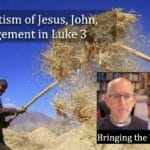The lectionary readings for Epiphany 3 in this Year C are 1 Cor 12.12–31a, and Luke 4.14–21, where Jesus returns from the desert ‘in the power of the Spirit’ and reads from Isaiah in the synagogue at Nazareth. If you are using the gospel reading, you can find commentary on that passage (together with a video discussion) here.
The passage in 1 Cor 12.12f flows directly on from last week’s reading, so if you are using this, then you will have a strong sense of continuity. The lectionary is not design to offer continuous readings, but it is nice when it happens! This does give the opening of the reading a slightly odd feel if you are reading it on its own, since it starts with a typically Pauline strong logical connective ‘For…’ or ‘Therefore…’ (Gk gar) ‘…just as…’
The previous section, from 1 Cor 12.4–11, has held together the diversity of gifts and ministries within the community of faith and their common bond by means of the image of the one Spirit giving many diverse gifts. Here, Paul shifts the image to make similar and related points by focussing on what it means to be ‘in Christ’; he does not use this favorite phrase in this passage, but this is the implication of being ‘part of the body’.
We are so used to the metaphor of the people of God as ‘the body of Christ’ that we fail to recognize how novel and striking this is.
Paul will go on in chapter 15 (which we will look at in two weeks’ time) to rehearse the things ‘of first importance’ which centre around Jesus’ bodily death, burial, and resurrection, and how so many, most of whom are still alive, saw Jesus in his risen body. So talking of the Christians gathered together in their meetings in Corinth as ‘the body of Christ’ is actually striking and jarring. Imagine talking about the church you are in as ‘the body of the vicar’! It would be rather startling.
But the other thing that Paul is doing, which is surprising in other ways, is that he is deploying a metaphor which was well established already in the first century as an image in Stoicism (a philosophy which pursued the ‘good life’ through the exercise of virtue) for the responsibility of belonging to a politic body (such as the citizens of a city).
Epictetus, writing a little after Paul, uses precisely the imagery of hands and feet to emphasize unity and common belonging in Discourses 2.5.24:
If you were a rational being, you would remember that in the same way as the foot is no more a foot if it is detached from the body, so you are no longer a man if you are severed from other men. For what is a man? A part of a state, of that first which consists of gods and men, then of that which is called the nearest to us, which is a small image of the universal state.
In this passage, Epictetus draws on the Stoic analogy of the body to stress that just as a foot is only meaningful as part of the body, so too a person is defined by their relationship to the larger community. Severing oneself from society or acting against others is akin to dismembering a part of the body—it disrupts the harmony and function of the whole. This makes Paul’s use look very familiar—but, as we shall see, he makes use of it in a distinct way which inverts its use in politics.
Paul introduces the idea in a surprising way too. We might expect him to say ‘Just as the body is one and has many members…so it is with the church‘ but instead he says ‘…so it is with Christ‘. This points us to the likely origins of his understanding of the people of God, those who are ‘in Christ’ and who by the Spirit say ‘Jesus is Lord’ (1 Cor 12.3), as being identified with Christ himself: his encounter with the risen Jesus on the road to Damascus. Jesus did not challenge Paul: ‘Why do you persecute my people‘ but ‘Why do you persecute me?’
The two ideas—of being one in Christ and one in the Spirit—are now interlocked in terms of the shape of the passage, as he returns to mention of the Spirit again before unpacking the metaphor of the body of Christ. We are one body, being in Christ, because we were baptized in the one Spirit. (See a similar trinitarian repetition of ‘one’ in Eph 4.4–6.)
But the Spirit is described using two liquid metaphors: the Spirit is the water into which we were baptized, but the Spirit is also the water of life that we have drunk. The language of being in the Spirit and the Spirit being in us finds parallels in Paul’s language of us being in Christ and Christ being in us (‘the hope of glory’, Col 1.27) which also parallels Jesus’ own language in the Johannine farewell discourse of ‘I am in the Father and the Father is in me’ (John 14.11 and elsewhere).
The image of the Spirit as the water of life is found hinted at in the Fourth Gospel, in Jesus crying out in John 7.38 and the water flowing from his side in John 19.34, but made more explicit as an image in Rev 22.1, 17. Thus, once more, we see that, despite the different registers of language, Paul’s theology matches that in other traditions within the NT.
Paul now rehearses the implications of the metaphor of the body, using a kind of deliberative rhetoric, imaginary a possible conversation between different parts of the body. But he approaches it from two perspectives, in two sections, from 1 Cor 12.14–20 and 1 Cor 12.21–26, each ending with a summary statement about the one body and the many parts. The first addresses the question of belonging, the second that of interdependence.
The ‘conversations’ in the first part are internal, as each body part ponders whether it really belongs or has importance. This connects quite closely with the previous section on the spiritual gifts; the Spirit gives to each as the Spirit wills, but we are not to say ‘Because I am not like that other person, because I do not have their gift or ministry, I don’t belong’. Just as feet are to be foot-like, and not hand-like, each member belongs just as they are, in terms of their gifts and ministries, and should not look at the gifts of others, and think that they don’t belong because they are not like them.
(This is such a vivid and engaging image that it is not hard to imagine this becoming an entertaining drama for an all-age service, with different people dressed us as giant eyes, ears, or noses, having these conversations with each other. Strangely, it is often these kinds of interactive presentations which help adults to learn best too—but we are too proud to admit it!)
Paul uses the image of the body to then express this in terms of the senses, and of course it was Aristotle who claimed that we have five senses (though we do in fact have between 8 and 20, depending on how you count them…!). But Paul’s point here is that it is God who arranges the members of the body ‘as he chose’ (v 18); the sovereignty of the Spirit in the previous passage is now the sovereignty of God here.
Paul’s conclusion here is that diversity of ministry and gifting is an essential part of what it means to be the body. This emphasis on difference, within the unity of the body, seems to be rather different from the point that Epictetus makes about the body politic. To be in the body of Christ means being different from others—and it is precisely this difference which confirms the reality of belonging. It is a vital antidote to the natural human tendency to think that we can only achieve belonging by conforming to the expectations of group membership, looking like the other members.
Paul’s second rehearsal of the nature of the body does come close to Epictetus’ use—the question of interdependence. Here, the imagined conversation is a dialogue, not an internal monologue. Whereas, firstly, no-one ought to look at themselves, and think they do not belong because they are not like others, here, no-one can look at another and dismiss them because of their non-conformity of gifting.
At the heart of this argument is a claim by Paul which is puzzling, and I think actually does not make sense in most English translations, read in detachment from the cultural context. His argument turns on this triple parallelism:
the parts of the body that seem to be weaker are indispensable,
and on those parts of the body that we think less honorable we bestow the greater honour
and our unpresentable parts are treated with greater modesty
I have highlighted the parallelism by using italics for the parallel references to the parts of the body, and bold the parallel responses to them.
At first, this looks contradictory: how can Paul say that we both ‘bestow greater honour’ and treat with ‘greater modesty’ those parts?
Paul appears here to be alluding to the parts of the body we are happy to display in public, and those which we hide from view, in particular, our ‘private parts’ (as we say in English—a fascinating phrase in itself!) and the process of excretion and defecation.
We are not ashamed of our heads or faces, and we are not embarrassed about eating in front of others. Yet, without defecation, we could not eat! The first, unclean and private activity, is indispensable if we are to enjoy the second, public one.
But the rest of the puzzle I think relates to clothing. We treat our ‘private parts’ with modesty—by lavishing on them the expense of clothing by which we cover them. We feel no need to lavish time, money and energy of covering up our head or face. Thus, argues Paul, we actually give more honour to those parts of the body which require greater modesty.
What is fascinating about Paul’s deployment of this argument is that it completely inverts the use of the body metaphor in Stoic thought. There, the rules of the city correspond to the head and face—not because head is a metaphor for power (which in Greek thought it is not), but because it naturally stands for elevation, prominence, and visibility. Those things which are hidden and not obvious are then held to be inferior.
But Paul counters that by noting that we pay more attention to those hidden things in our act of dressing!
This leads Paul back to his claim that it is God who orders the body, and gives honour to all, so that we should do the same. Because we belong to one another in the body, we share both honour and suffering together. (I am currently brushing up on my French, and it is interesting that where in English we say, grammatically, ‘I hurt my hand’, in French you say ‘I hurt myself to my hand’—though I am not sure the grammar shapes the thought!)
Paul is appealing here to ordinary experience. When we say ‘I have a terrible headache’, we never follow that by saying ‘But my hands and feet feel just fine!’ When one part of the body is affected, the whole body feels it.
The final section of this passage draws together the ideas from the previous section (on gifts of the Spirit) together with the metaphor of the body.
Paul repeats, with variation, the thesis that he started with in 1 Cor 12.14: one body has many members, and you are each a distinct member of the one body. (I don’t really understand why several English translations use the language of ‘individually’; this is not a term or an idea that is in the text.)
It is worth noting that the Greek term for ‘member’ is melos; this can also denote a line of melody (and it is where we get this word from) or a musical part. Ironically, the Romans and Greeks only sang in single lines of melody; polyphonic singing was developed in the Middle Ages, within monastic contexts, and illustrates nicely Paul’s point here!
He then ‘brings the metaphor in to land’ by returning to the explicit mention of different ministries, and this confirms three things.
First, the list does not match exactly what has gone before, confirming that each of these lists is illustrative rather than comprehensive or prescriptive (compare the list in Romans 12.)
Secondly, although in the previous passage Paul’s emphasis was on a ‘democratisation’ of gifts, an egalitarian description without hierarchy, there is still an ordering of gifts, since some are foundational to the ministry of the church (apostles) and others then follow on. Interestingly, Richard Hays (in his Interpretation commentary) suggests that the order here is the natural order of what you would want for the scenario of church planting. And this ordering relates closely to the so-called ‘fivefold order of ministry’ that we find in Eph 4.11 (the debate here is whether ‘pastors’ and ‘teachers’ are two different ministries, or one of ‘pastor-teacher’, making the list four not five).
Thirdly, he returns to the question of diversity rather than uniformity by asking a series of questions—all in the form that demands the answer ‘no’! Do all speak in tongues? No, though some do! This challenges any ecclesial context where there is the implicit or explicit claim that there are some gifts which all must have.
Paul’s final comment is rather at odds with all this: despite the sovereignty of the Spirit in giving gifts, and despite God’s sovereignty in ordering the body, we are still to ‘desire’ some gifts above others—not out of a need to belong or a desire for status, but in order that we might most effectively serve our sisters and brothers in the body.
Come and join James and Ian as they discuss all these issues!

 Buy me a Coffee
Buy me a Coffee




























Yes, ‘familiarity breeds contempt’ — the body imagery is striking and Paul uses it to great effect. With this comment as below, are we saying that the Spirit is received at water baptism:
“We are one body, being in Christ, because we were baptized in the one Spirit. (See a similar trinitarian repetition of ‘one’ in Eph 4.4–6.) But the Spirit is described using two liquid metaphors: the Spirit is the water into which we were baptized, but the Spirit is also the water of life that we have drunk.”
Not directly; it is a metaphor.
But ideally, yes. The two are not identical, but ideally they happen at the same time.
There is obviously no trinitarianism in I Cor 12, nor is Eph 4:4-6 a trinitarian statement. The emphasis on ‘one Spirit’ is simply an emphasis on one as opposed to more than one, i.e. the disunity that arises from believers not recognising that they are all members of one body.
‘There is one body [i.e. the body of Christ, the Church] and one Spirit [the Holy Spirit inhabiting that body, i.e. Christ’s Spirit]—just as you were called to the one hope that belongs to your call— one Lord [Jesus Christ], one faith, one baptism, one God and Father of all, who is over all and through all and in all.’
So Paul mentions the Spirit, the Lord Jesus Christ, and God who is over all. This is not trinitarianism as most people understand it – if they do understand it. God is not one third of the godhead. He is God over all, distinct from the Spirit as given to the Church and distinct from the Lord Jesus.
Rom 8:9 ‘You, however, are not in the flesh but in the Spirit, if in fact the Spirit of God dwells in you. Anyone who does not have the Spirit of Christ does not belong to him.’ The Spirit is not a separate person but the Spirit of God [also I Cor 12:3], who is over all, and the Spirit of Christ, ‘the Lord who is the Spirit.’ The Spirit proceeds from both.
Caveat, Stephen R.
You do not accept the Triunity of God anywhere, do you… as an a priori hermeneutic?
Geoff Not only does Steven Robinson not accept the Trinity, his final two paragraphs , in particular where it begins with the statement “God is not one third of the Godhead” reveals tht he doesn’t understand it! I would go further to suggest that the wording of his final paragraph indicates that he experiences some difficulty in comprehending the actual NT message.
Hi Stephen… I’d suggest that few Christians do anything more than accept the Trinity and certainly don’t delve into the depths. I don’t criticise them for this but “most people ” isn’t much of a guide to understanding.
“God is not one third of the godhead” is true but not something that gets proclaimed anywhere I know.
The Athanasian Creed is a more robust setting out
What is more, it is only in the eternal – intra -Triune God can it be said that God is love. That can not be said of a singular, uni- person god.
It is not a name (one of many) in Islam.
Thank you, James and Ian, so many springboards here to dive from into the text; waters to swim in!
Concerning the church of antiquity and its praxes and responsibilities.
Two or three prophets should speak
In the early church, the gift of prophecy was valued as a means of edification, exhortation, and comfort to the believers (1 Corinthians 14:3).
The instruction for “two or three prophets” to speak reflects a structured and orderly approach to worship, ensuring that the congregation is not overwhelmed and that each message can be properly received and understood.
This mirrors the practice in Jewish synagogues where multiple teachers might expound on the Scriptures. The limitation to “two or three” also suggests a balance between allowing the Spirit to move and maintaining order, as God is not a God of confusion but of peace (1 Corinthians 14:33).
1 John 4:1
Beloved, do not believe every spirit, but test the spirits to see whether they are from God. For many false prophets have gone out into the world.( perhaps here the discernment of spirits gift might come into play?)
If not present then recourse to:-
Acts 17:11
Now the Bereans were more noble-minded than the Thessalonians, for they received the message with great eagerness and examined the Scriptures every day to see if these teachings were true.
Paul’s summary 1 Th 5:21 “Prove all things; hold fast that which is good”.
And his final thought 1 Cor 10:15 I speak as to wise men; judge ye what I say.
There is no suggestion of a ritual priesthood or hierarchy, even among Apostles.
Plus, there is placed on all the Church to hold preachers to account and of some, provoke them to be taught of the Spirit.
Christianity is not an intellectual pursuit it is a union with God, from the Father through the Son by the Spirit.
However that Union is another springboard.
It strikes me that when God creates awesome things they are characterized by diversity (think multicoloured rainbows, densely packed rainforests, rolling mountain ranges) but when manking creates awesome things they are characterized by uniformity (think the Red Army military parade). So of course His Church is a mix of different gifts, and a body of feet, eyes, ears, and hands.
The argument St Paul employs about the weaker parts of the body being those we regard as indispensable, is a very fascinating take on the idea that the first shall be last and the last shall be first.
Perhaps the most striking aspect of the passage is that, as you point out, Paul doesn’t say that the Church is a body but instead that we are the body of Christ. By coincidence the previous article was looking at Ephesians 5 where St Paul says that, like in marriage, the Church and Christ are one flesh (i.e. one body) and Christ cares for us as member of his own body. And this is why the resurrection of Christ is so central: by the time we get to 1 Corinthians 15 St Paul is telling us that without the resurrection our faith, no matter how sincere, is futile. If all that happened is Christ died on a cross, then we are one flesh with a corpse. It’s because He’s alive, that joining with him brings us eternal life with the Father, an adoption to sonship through Christ (Ephesians 1).
The Topic of leadership is in current vogue.
Our passages and comments recently revolve around leadership issues in the Churches.
Apart from leadership we are informed of the responsibility of the church member((s); which in our case, is that the church members have concurred with its leadership as such.
Hence there is a dual question of concern to some regarding the nature or theology of leadership and followers.
There are a couple of very good papers on the theology of leadership
@ Sola Ecclesia-
A Crisis of Leadership and the Elder Solution (Part 1): Theology Is Upstream
And- Leadership, Crisis, and Sabotage.
A sermon by M L Jones on Isa. 22 v 8 ff suggests that declining morality (generally) is at base the reason for National and Ecclesial decline.
Rated by some as one of the great evangelistic sermons of his ministry.
Available to listen to @ https://us22.campaign-archive.com/?e=6fb8cdd504&u=0edfb49e499cca337d7796da1&id=de019d40dd
“Despise not prophesies”
OR as Moses said “would that all Gods’ people were prophets”
Having identified “the Body “and provisions for its healthy development.
Ministries and their ministers must expect and plan for crisis and sabotage and not grow weary in well doing; for in due season, we will reap, if we faint not (Gal. 6:9).
Scientists spend a great deal of time and money seeking anti -virals; they are convinced that there will be further devastating pandemics.
Oswald Chambers defined health as “The forces on the inside successfully combating the forces on the outside”.
Of course there will be many who will neglect or refuse to acknowledge the need for anti- virals believing that herd immunity will deal with the issue, ok, a few of the old and weak will go to the wall, so what.
The church as a body is also threatened with viruses and to despise prophesy
Is to in effect say “so what”
Just as in OT antiquity there were those who dispised prophicies,there was no fear of God, carelessness and neglect led to catastrophic consequences for the people.
It is well that the body is aware of the kinds of viruses that are at enmity with the body and make provisions to combat them.
In “Christianity and Functional Liberalism (or How Evangelicalism Denies the Faith) Bryan Laughlin and Doug Ponder discuss one such virus and its’ debilitating and ultimately mortally destructive course.@
https://solaecclesia.org/articles/christianity-and-functional-liberalism/